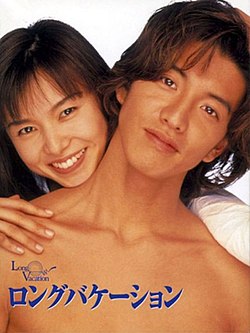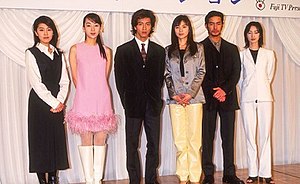Long Vacation
Long Vacation (ロングバケーション, also known as ロンバケ[2]) is a Japanese television drama series from Fuji Television, first shown in Japan from 15 April to 24 June 1996.[3]
| Long Vacation | |
|---|---|
 Long Vacation DVD/Blu-Ray cover | |
| Japanese | ロングバケーション |
| Genre | Drama, romance |
| Written by | Eriko Kitagawa[1] |
| Directed by | Kōzō Nagayama Masayuki Suzuki Hirotsugu Usui |
| Starring | Takuya Kimura Tomoko Yamaguchi |
| Opening theme | La La La Love Song (Toshinobu Kubota) with Naomi Campbell |
| Country of origin | Japan |
| Original language(s) | Japanese |
| No. of series | 1 |
| No. of episodes | 11 |
| Release | |
| Original network | Fuji TV |
| Original release | 15 April – 24 June 1996 |
The show's high ratings in Japan made Takuya Kimura popular in the Asia-Pacific region and is known as "The King of Ratings.[4]
The characters in the series have something in common—if not jobless, they can do no better than secure a temporary job. This is a portrayal of a time when Japan was plagued by deep recession, when its people suffered profound depression from constant failure to earn a stable income. The series also portrays how relationships are made and broken, and explores how people come to depend on each other for solace.
Plot Summary
Minami and Sena meet when Sena's apartment-mate, Asakura, jilts Minami on their wedding day. Minami learns from Sena that Asakura has left, whereabouts unknown. Sena allows Minami to move into the apartment, since she is penniless, having given all her money to Asakura, and cannot pay the rent on her apartment.
This is the beginning of a romance between Sena and Minami. Minami and Sena confide in and console each other about their relationship problems and their lack of success in life.
Minami meets a professional photographer, Sugisaki, who proposes marriage. Finally Sena has a chance of winning a piano competition and going to Boston, joining the symphony orchestra.
Cast

- Takuya Kimura as Sena Hidetoshi (瀬名秀俊)
- Tomoko Yamaguchi as Hayama Minami (葉山南)
- Yutaka Takenouchi as Hayama Shinji (葉山真二)
- Takako Matsu as Okusawa Ryoko (奥沢涼子)
- Izumi Inamori as Koishikawa Momoko (小石川桃子)
- Ryō as Himuro Rumiko (氷室ルミ子)
- Leo Morimoto as Professor Sasaki (佐々木教授)
- Ryōko Hirosue as Saito Takako (斉藤貴子)
- Kosuke Toyohara as Sugisaki Tetsuya (杉崎哲也)
Episodes
| Episode | Date | Rating (%) |
|---|---|---|
| 01 | 15 April 1996 | 30.6 |
| 02 | 22 April 1996 | 28.3 |
| 03 | 29 April 1996 | 29.0 |
| 04 | 6 May 1996 | 27.6 |
| 05 | 13 May 1996 | 27.9 |
| 06 | 20 May 1996 | 25.5 |
| 07 | 27 May 1996 | 27.7 |
| 08 | 3 June 1996 | 29.9 |
| 09 | 10 June 1996 | 29.1 |
| 10 | 17 June 1996 | 28.6 |
| 11 | 24 June 1996 | 36.7 |
Production
The theme song was La La La Love Song by Toshinobu Kubota with Naomi Campbell.[5]
Media
Long Vacation was released on DVD in Japan on November 21, 2001.[6] At the time it was released, it had a limited edition booklet released alongside the first 5,000 DVD copies.[7]
Novel
A novelization of Long Vacation was written by Eriko Kitagawa.[8]
Broadcast
It was formerly broadcast in Hong Kong.[8] In the US, it was formerly aired via KTSF TV with English subtitles.[8]
On July 22, Viu announced that they have acquired the streaming rights to broadcast Long Vacation to Southeast Asia with regional subtitles alongside Love Generation, A Sleeping Forest, The Ordinary People, Hundred Million Stars From The Sky and the Hero series.[9]
Reception
When the series debuted in Japan, it was popular with the female audience that the expression The Office Lady disappears on Monday from the city (月曜日はOLが街から消える, Getsuyōbi wa OL ga machi kara kieru) was used to highlight its fanbase.[3] The episodes had an average rating of 29.5% in viewers with the final episode having a rating of 36.7% in audiences.[3] According to a research study conducted by NHK in 2009, the majority of viewers were those who are 13 years old at 40% of viewers, the second group of viewers are from those in their 20s at 34%.[10]
The series was popular with viewers in Hong Kong thanks to pirated DVD copies sold there before the show was legally broadcast there.[8]
On November 11, 2019, Fuji TV announced that photos and props from the show were on display at Fuji TV's Headquarters in Odaiba to highlight the most popular dramas viewed through the Heisei Era in an exhibit until January 2020.[3]
According to Television, Japan and Globalization, the themes of finding happiness are embodied through Minami when she mentions of her right to seek happiness by herself instead of getting married.[11] This view is centered on people's lives when they look for existential meaning.[11]
References
- https://www.japantimes.co.jp/culture/2009/02/20/films/film-reviews/halfway/
- http://loca.ash.jp/show/1996/d199604_longvaca.htm
- https://www.fujitv-view.jp/article/post-13951/
- https://metro.style/culture/film-tv/12-iconic-takuya-kimura-dramas-to-watch-on-viu/26370
- https://www.scmp.com/article/991600/baddest-hit-parade-cd-toshinobu-kubota
- https://www.amazon.co.jp/%E3%83%AD%E3%83%B3%E3%82%B0%E3%83%90%E3%82%B1%E3%83%BC%E3%82%B7%E3%83%A7%E3%83%B3-DVD-%E6%9C%A8%E6%9D%91%E6%8B%93%E5%93%89/dp/B00005QYIN
- https://web.archive.org/web/20140727184303/http://hp.ponycanyon.co.jp/pchp/cgi-bin/PCHPM.pl?TRGID=PCHP_SKH_1010&CMD=DSP&DSP_SKHBNG=200100001340&DSP_SKHKETSEQ=001
- Clements & Tamamuro 2003, p. 165.
- https://www.lionheartv.net/2020/07/viu-acquires-exclusive-ott-rights-to-12-iconic-takuya-kimura-dramas
- https://www.nhk.or.jp/bunken/research/title/year/2009/pdf/003.pdf
- Yoshihiro, Tsai & Choi 2010, p. 213.
Bibliography
- Clements, Jonathan; Tamamuro, Motoko (2003). The Dorama Encyclopedia: A Guide to Japanese TV Drama Since 1953. Stone Bridge Press. ISBN 978-1880656815.
- Yoshihiro, Mitsuhiro; Tsai, Eva; Choi, JungBong (2010). Television, Japan, and Globalization. University of Michigan Center For Japanese Studies. ISBN 978-1929280599.